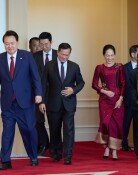Will N. Korea Give Up Its Nuclear Weapons?
Will N. Korea Give Up Its Nuclear Weapons?
Posted March. 10, 2007 07:45,
After reaching an agreement in February at the six-party talks, the diplomatic situation on the Korean peninsula is undergoing its greatest transformation since the Korean War. The half-a-century-long archenemies North Korea and the United States have recently held bilateral talks in New York in which they discussed improving their relationship and establishing a peace regime to replace the armistice on the Korean peninsula. This is an unprecedented development in bilateral relations.
Some are quick to predict that a full implementation of the February agreement would lead to the establishment of a peace regime on the last bastion of the Cold War. But many others worry that the North Korean nuclear issue will not be solved diplomatically if Pyongyang wont give up its nuclear weapons. Is the establishment of a peace regime on the Korean peninsula an achievable goal? Or, is it just an empty dream?
Did Nuclear Weapons Revive North Korea? -
Pyongyang was isolated from the international community because of its nuclear program, but successfully used its nuclear test last year as a golden opportunity to come back into the international community. With Washington searching for a diplomatic solution rather than a military one, the North succeeded in turning its greatest crisis into an opportunity to improve its relationship with the United States.
Washington decided to release the Norths financial assets frozen in the Macau-based Banco Delta Asia and provide Pyongyang food and energy assistance, including one million tons of heavy oil. Such a move is in return for the disablement of the Norths nuclear facilities and registration of its nuclear facilities, excluding nuclear weapons, which the North already owns.
It appears that the U.S. will establish a peace agreement and ambassador-level diplomatic ties with North Korea if the North dismantles its nuclear weapons. This is because that the Bush administration, mired in the Iraq war, is trying to make a diplomatic achievement out of the nuclear issue. Some in the U.S. and China argue that the Norths dismantlement of its nuclear program and the establishment of a peace regime on the Korean peninsula will happen before the Beijing Olympic Games in August 2008.
Is Pyongyang Willing to Renounce Its Nuclear Weapons?-
Optimists predict that the North will renounce its nuclear program if its regime survival and energy assistance is guaranteed. Yoshida Yasuhiko, a professor at the Osaka University of Economics and Law, said, The North will renounce its nuclear weapons, if Washington guarantees Pyongyangs regime survival with a legally binding treaty and the members of the six-party talks offer to provide a light water reactor first.
However, Hong Gwan-hee, an expert on North Korea, said, The nuclear program is a strategic goal that North Korea will not compromise on, adding, The North comes to the negotiating table now because it is confident about running its hidden nuclear facilities other than the Yongbyon nuclear facility, which it agreed to shut down.
Is a Peace Regime Possible?-
Pyongyang is clamoring for a peace agreement with the U.S. Han Song Ryol, former deputy chief of North Korea`s mission to the United Nations, proposed a three-party peace agreement among the two Koreas and the U.S. But experts point out that the real intention of the North is to have the South play a supporting role in cementing the bilateral structure between the North and the U.S.
Meanwhile, Seoul still supports a four-party peace agreement that includes the two Koreas, the U.S. and China. Therefore, chances are that concerned parties could have some trouble over the composition of the forum for discussing a peace regime.
There are numerous challenges ahead even if the four-party forum is established. The U.S. wants to sign on to a peace treaty after Pyongyang completes the dismantlement of its nuclear weapons, but Pyongyang is expected to argue that a peace treaty is a prerequisite to the dismantlement. Also, chances are that Pyongyang will demand that a peace treaty include a clause on the withdrawal of U.S. forces in South Korea, in an attempt to shake the R.O.K-U.S. alliance.
Will Seoul Be Left Out?-
A senior government official of the South said, Watching China actively working to resolve the nuclear issue last year, the U.S. began to view the Korean peninsula issue in a bigger framework of U.S.-China relations, adding, It is hard to say no to a joint Washington-Beijing initiative concerning the future of the Korean peninsula.
Some worry that if the haggling with the North continues endlessly, the U.S. and China might be satisfied with the shutdown of the nuclear facility and sign on to a peace treaty, winking at the fact that Pyongyang has developed nuclear weapons in the past.
Kim Tae-hyo, a professor at Sungkyunkwan University, said, Although the chances are slim, if the U.S. discusses a peace regime without raising the issue of the nuclear warheads and plutonium for making nuclear weapons that the North has, while promising to establish diplomatic ties with the North, that will have a negative impact on the R.O.K-U.S. relationship.
There is a long way to go until the dream of establishing a peace regime on the peninsula. The realization of the dream effectively depends on the Norths choices.
gun43@donga.com






